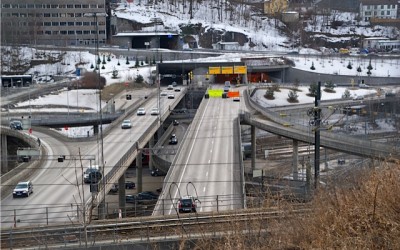Commuters may come out the best as Norway’s once-high-flying economy adjusts to what politicians and economists are calling “The New Normal.” That refers to the country’s upcoming period of slower growth, when falling oil prices will force economic diversification.

With economists like Øystein Dørum of DNB Markets saying that Norway’s “golden age” is over, Finance Minister Siv Jensen is being advised to allocate more state funding to construction of roads, rail lines and public buildings, not least to avoid any significant increase in unemployment.
If there ever was a finance minister keen to invest more heavily in roads, it’s Jensen. As leader of the Progress Party, she’s been agitating for years for the state to invest more heavily in roads and other infrastructure that’s been neglected for decades. The current conservative government coalition of which she’s a member has already earmarked record amounts on transport projects but much more is needed to relieve traffic congestion in and around Norway’s population centers.
Such projects have often been held up in Parliament, because of Norway’s “district politics” that for decades put a priority on outlying over urban areas. That seems to be changing and now the government led by Prime Minister Erna Solberg and Jensen have some expert support.
Dual advantage of public works projects
Economist Steinar Strøm, a professor from the University of Oslo who’s now on the faculty at the University of Torino in Italy, and Knut Røed, senior researcher at the Frisch Center, are urging public-sector investment both because road and other infrastructure improvements are needed and because the public spending can create new jobs and keep engineers and construction workers employed.
“It would be wise, both in the short and long term, to launch investment projects within transporation, health care and schools,” Strøm told newspaper Dagens Næringsliv (DN). “There are many good projects (like) intercity trains, tunnels for trains and the metro under Oslo.”
Strøm thinks the government should concentrate on road and rail building around Norway’s biggest cities. “The government should concentrate on the areas where people actually live, instead of spending on all types of road projects along the west coast,” Strøm said.
Røed also thinks the government can use more state funds to invest in needed infrastructure while also maintaining economic growth as oil investments wane. “There has been so much neglect for many years, and spending now will yield savings later,” Røed told DN.
Interest rate cut debated
Professor Ragnar Torvik at NTNU in Trondheim thinks the best measure against an economic downturn in Norway would be another interest rate cut. That, he says, would make Norwegian goods and services more competitive internationally. Dørum of DNB disagrees, saying interest rates that are even lower than today’s would only fuel even higher real estate prices and higher debt levels.
Jensen and Solberg met with central bank boss Øystein Olsen just before the weekend, in a move widely viewed as an effort to show they are taking economic challenges seriously. They had little new to report after their session on Friday, repeating claims that there is sign of economic crisis in Norway, only that growth may slow to a “New Normal.”
Norway remains strong enough, all three claimed, to adapt to lower oil prices and lower levels of oil sector investments. Commentators claimed Solberg and Jensen mostly sought to both calm and prepare Norwegians for slightly tougher times ahead.
newsinenglish.no/Nina Berglund

